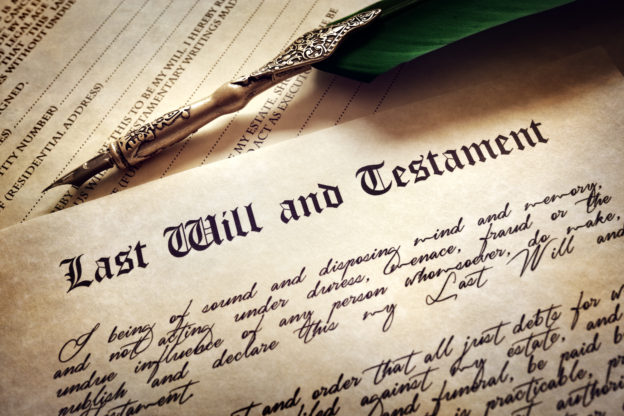Trust Planning for Your Minor Child
Being a father of minor children, I often am so busy running, chasing or sneaking to take a nap that I often find it difficult to do much else, including eat, sleep and work. But as a parent, I have to consider what will happen to my assets and my children if something were to happen to my wife and me. Such a question is often not so easy to resolve and many of the options which come to your mind instantly may not be the best options. Often times I hear parents say that they have changed all of their beneficiary designations for their insurance policies and financial accounts to name their minor children as contingent beneficiaries. The downside of designating minors as beneficiaries, is that minors cannot legally own or manage property, only an adult person with legal capacity can. In response to being told that minors cannot own property, I may be told, well can I just designate my relative or a close personal friend as the beneficiary of my assets, and they can manage and distribute the assets as they see fit to my children. The concern with that scenario, is that the relative or the close personal friend will be treated for legal and tax purposes as the owner of the account, and any assets distributed by this person to your children may be treated as a gift. Moreover, if this person begins to treat some or all of these assets as theirs then a legal battle would likely ensue with unpredictable results. To alleviate such issues arising, parents of minor children should consider implementing trusts for their children into their estate plans. By implementing children trusts into their estate plans, a parent would be creating a legally defined and enforceable relationship between a “trustee”, the person who manages the trust assets, and the “beneficiaries”, who are your children that are entitled to distributions under the trust from the trustee. The terms of the trust for your children can be customized. That is, you can define for what purposes a trustee can make distributions to your children. You can even decide to implement a trust which terminates automatically at a certain age, which you can pick. Or as an alternative, you can create a trust which continues for the lifetime of a child. A lifetime trust can be very beneficial for a child even when he or she reaches adulthood because a lifetime trust generally provides asset protection from a child’s personal creditors, judgments or a later divorce. You would even have the ability to designate when your children could serve as his or her own trustee to manage and control their trust and determine when to make distributions. I am here to assist you with providing you with options to consider for your estate plan and guidance in choosing the estate plan that best fits your family, including Trusts for your children. Please contact me to schedule an appointment to discuss further.
Read moreBlended marriages: The Unintended Consequences of Dying without a Will or Trust
Sadly, the rules of descent and distribution which apply if someone dies without a will or trust may provide an unexpected outcome. It has been our experience that many people have common misunderstandings regarding how these rules are applied and are unaware of nuances which modify distributions under specific circumstances. In this day and age of mixed and blended families, it is unlikely that anyone would want old statutory descent and distribution laws to control who receives or manages assets earned over a lifetime of hard work. A common misconception we encounter is that many people believe their spouse will inherit everything when they die intestate (without a valid will or a valid trust which otherwise fully disposes of his or her assets), which is often their underlying intention. However, that is simply not always the case in Texas. Pursuant to the rules of descent and distribution, if you die intestate and have children from outside your current marriage, then your half interest of all community property in your marriage will be shared amongst your children instead of being passed along to your surviving spouse who owns the other half. Under most circumstances, this is an unwelcome result for the surviving spouse who now owns their homestead with their deceased spouse’s children, whom likely cannot share in payment of the mortgage, upkeep and other related expenses. Then without a judicial partition or the agreement of deceased spouse’s children who are co-owners, the surviving spouse will likely not be able to sell the marital homestead. This situation is further complicated if any of the deceased spouse’s children are minors, because minors lack the legal capacity to consent to the sale of their real property which must be granted to an adult through judicial means and with court supervision, which will likely substantially increase the time and cost involved in selling real property. The complications only become worse if the deceased spouse dies intestate owning separate property, which generally speaking could include property acquired by gift, inheritance, or before marriage. Under such circumstances, the deceased spouse’s children will inherit two thirds of any personal separate property and the entirety of your separate real property owned by the deceased spouse, while the surviving spouse only receives a life estate in one third of the separate real property. That is, the home you lived in believing it was yours, may actually be owned by your spouse’s children. And if your spouse did not have children, you may be sharing ownership with your spouse’s parents and/or their descendants. Imagine a situation where your husband or wife dies without a Will and has two minor children who live with their other parent…your spouse’s ex. Those children, controlled by their custodial parent, now own half of your spouse’s community property assets and an even larger percentage of your spouse’s separate property assets. This can be a nightmare come true for any widow or widower who instantly loses half of their estate. These are not the sorts of results most people envision or could even fathom. The attorneys at Beck & Associates, PLLC stand ready to […]
Read moreProtecting Your Children’s Inheritance
Most people either have a very simple Will or no Will at all. As a result, most surviving children receive their inheritance outright and free of trust. An outright inheritance isn’t usually a problem unless the child is a minor, gets divorced, gets sued or has creditor issues. In these types of cases, the inheritance might be taken by the child’s creditors or divorcing spouse. The best way to protect your children from their potential creditor issues is to leave their inheritance in a trust for the child’s lifetime. A trust is a legal arrangement in which the assets of a trust are managed by the Trustee for the benefit of a beneficiary (i.e., your child). Each adult child can serve as his or her own Trustee if the parent believes the child is responsible. If not (or if the child is a minor), the parent can select another responsible person (usually a relative or family friend) or a bank’s trust department to serve as Trustee of the child’s trust. [NOTE: Minors cannot legally own property in Texas, so a trust is the superior method of providing an inheritance for minor children.] In a typical trust arrangement, the Trustee can distribute as much income and/or principal from the trust as is necessary for the beneficiary’s health, education, maintenance or support. This generally includes expenses for food, clothing, housing, medical, vehicles, education and vacations. More importantly, no one can force the Trustee to distribute trust assets to satisfy any debts of the beneficiary or judgments against the beneficiary (including bankruptcy and divorce). Historically, trusts have been commonly used to reduce or eliminate estate taxes for wealthy individuals. But now, trusts are becoming more popular as an asset protection strategy for more modest estates. In summary, a trust arrangement allows your descendants to fully enjoy the inheritance you have given them while insulating the assets from your child’s creditors’ claims. Sometimes you can get your cake and eat it, too! If you have any questions or if you would like to discuss adding a trust to your estate plan, please give us a call.
Read moreWills vs Trusts
As a lawyer who prepares a lot of Wills and Trusts, I frequently meet with prospective clients who are unsure if a Will or a revocable living trust (or “RLT”) would best meet their needs. Typically a well drafted Will would suffice because the actual number of people in Texas that actually “need” an RLT are very few. However, there are several specific situations where an RLT can be advantageous when compared to a typical Will. Probate Avoidance: If you transfer all of your assets to the name of your RLT, you can then avoid the need for your family to go through probate when you die. However, if you forget to transfer one asset to the RLT or later buy an asset in your personal name instead of the name of the RLT, you might not be able to avoid probate for that one asset. Out-Of-State Property: Perhaps the most common advantage of the RLT over a Will involves the transfer of property located in another state or country. For example, I have a friend who inherited the family real estate located in Florida. If she simply had a Will, we would need to probate her Will in Texas to transfer her Texas property and again in Florida to transfer the Florida property. However, by transferring her out-of-state property to the RLT, she can avoid probating her Will in Florida. Will Contest: An RLT can provide better protection against a challenge or contest of the Will or the RLT. If you have a Will that has been filed for probate, then a court case is opened in the county courts and it is very easy for someone to challenge the Will in that open court case. It might be as simple as writing a letter to the Judge. If the client had an RLT instead of a Will, there is no need for the Trustee to open a court case at all. This means that a person wishing to challenge the RLT must jump through more legal hoops and file a lawsuit in the appropriate court to challenge the RLT, which makes it that much harder for him or her fight your wishes. Mobility: For a family that moves from state to state, an RLT offers the benefit of being much more mobile than a Will. An RLT typically has a provision that allows the Trustee to change the applicable law which governs the trust with a simple notice to the Trustee. This provision can be triggered each time the family moves to a new state to change the governing law of the trust match the new state’s laws. Conversely, a Will is more likely to need drastic revisions to comply with the new state’s laws. Management During Disability. With the aging of the baby boomers, more clients need an RLT to assist with management of their assets during a disability. If an aging spouse or an aging parent is losing their ability to manage their own finances, an RLT can be used as an asset management vehicle. The spouse without the disability or […]
Read more



